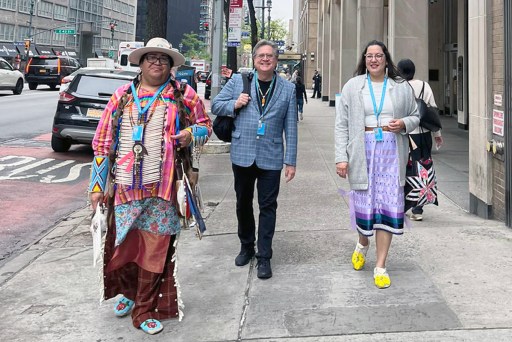
By Melodie Woerman
Episcopal News Service
The March 30 statement by Pope Francis repudiating the “Doctrine of Discovery” had a major impact on the three people who represented the Episcopal Church at the 22nd session of the United Nations Permanent Forum on Indigenous Issues that met April 17-28 in New York.
The Roman Catholic Church was the last major Christian denomination to repudiate the doctrine, making the pope’s statement “a significant advancement,” said the Rev. Brad Hauff, the Episcopal Church’s missioner for Indigenous ministries and a member of the Oglala Lakota tribe.
Previously, addressing the doctrine’s negative impacts was harder when “over 50% of the world’s Christians were not on board with it,” he said.
The Episcopal Church led the way as the first Christian body to repudiate the Doctrine of Discovery through an act of General Convention in 2009. The doctrine established a religious, political, and legal justification for colonization and seizure of land not inhabited by Christians.
Monarchs and nation-states used the doctrine, which dates to 15th-century papal statements, called “bulls,” as justification for the subjugation of Indigenous peoples in Africa, Asia, New Zealand, and the Americas. In the United States, this included forced removal of tribes from their ancestral homelands to reservations, massacres and removing children from their families to attend residential boarding schools designed to erase their culture.
During each of the annual U.N. forum meetings Hauff has attended, there has been a commonality of issues, no matter where delegates lived, that resulted from colonization that was justified by the Doctrine of Discovery, he said.
Hauff was joined by two other two delegates – Melissa Chapman Skinner, Standing Rock Sioux from the Diocese of South Dakota and Ronald Braman, Eastern Shoshone from the Diocese of Idaho – who had the chance to provide statements, called interventions in U.N. language, addressing the doctrine.
To read the rest of the story, click here.


